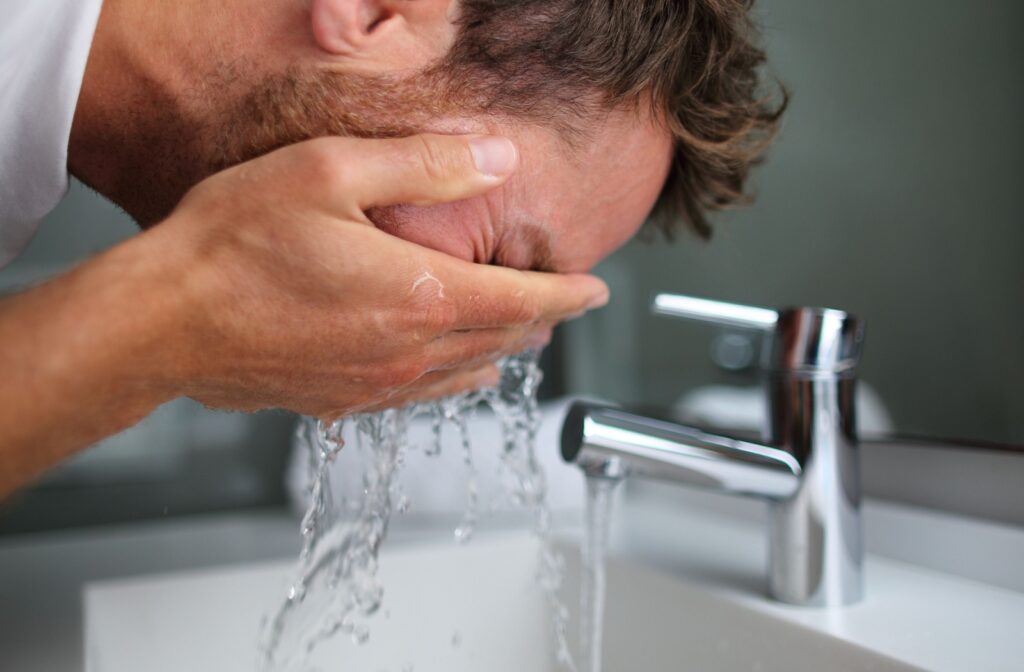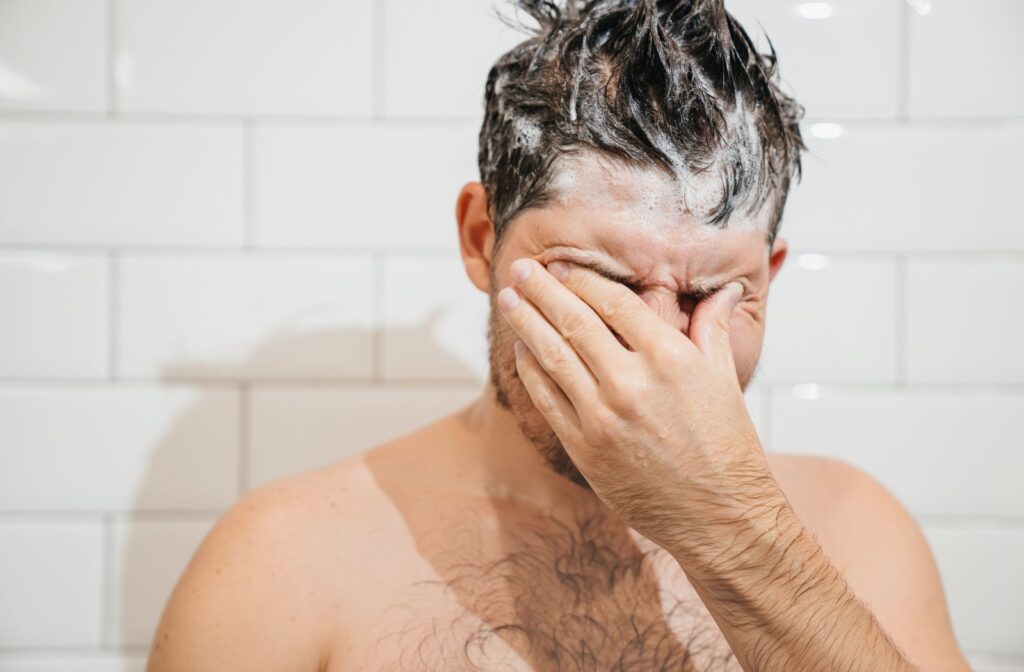Getting soap in your eyes can be painful and uncomfortable. The sudden stinging sensation can leave you blinking and tearing up, unsure whether you need to worry or just rinse and move on.
If you do get soap in your eyes, your eyes may sting or become irritated, but it typically won’t cause permanent damage. Knowing how to respond and when to seek care can make all the difference in protecting your vision.
How Soap Affects the Eyes
Most soaps and shampoos are made with ingredients that can irritate the surface of your eyes, especially the cornea and conjunctiva. When these areas are exposed to soap, you might experience symptoms like:
- Burning or stinging
- Redness
- Tearing
- Blurry vision
However, symptoms are usually temporary and should subside shortly after rinsing the eyes with clean, lukewarm water.
Not All Soaps Are the Same
The severity of irritation depends on the type of soap involved. Mild hand soaps or baby shampoos are typically less irritating. In contrast, products like dish soaps, industrial cleaners, or highly perfumed bath products can cause stronger reactions.
Bubble bath soaps and other fragranced or coloured bath products are more likely to cause irritation. These soaps can disrupt the tear film, leaving the eye feeling dry and uncomfortable even after rinsing.
Other Ingredients That Can Irritate
Some soaps contain alcohols, preservatives, or plant-based extracts that might be harsh on the eyes. While these ingredients are safe for the skin, they can also disrupt your tear film or irritate the cornea. Reading product labels helps you avoid ingredients that frequently trigger discomfort, especially if you’ve had reactions in the past.
Will Soap Cause Long-Term Eye Damage?
In most everyday situations, soap in the eye does not cause permanent injury. Chemical eye injuries that lead to lasting vision issues typically involve stronger substances, like acids or alkalis.
Soaps are usually neutral or only mildly alkaline, which means that, while they might irritate the eye, they’re unlikely to penetrate or permanently damage deeper eye structures.
How to Safely Rinse Soap from Your Eyes
If you accidentally get soap in your eyes, the most important thing to do is rinse them thoroughly. Here’s how:
- Wash your hands before touching your eyes.
- Use clean, lukewarm water to rinse the affected eye for at least 15 minutes.
- Try to hold your eyelids open while rinsing to allow water to reach the entire surface.
Blinking during rinsing helps dislodge any lingering soap. If you wear contact lenses, remove them before or during rinsing if possible.

Signs You Should See an Optometrist
While most soap-related eye irritation clears up quickly, some situations do require professional help. Seek medical attention if:
- The burning or pain persists after rinsing
- Vision remains blurry for more than an hour
- You notice discharge, swelling, or unusual redness
These symptoms may indicate a more serious reaction or infection, especially if the product involved wasn’t meant for use near the eyes.
Soap & Children’s Eyes
Children are more likely to get soap in their eyes during bath time. Their eyes are also more sensitive, so they may show stronger reactions.
Try to use tear-free, fragrance-free products when possible. If soap does get in your child’s eyes, follow the same rinsing steps and monitor for signs of lingering irritation. Their reaction might seem dramatic, but that’s because kids can’t always explain what’s wrong. Reassure them and rinse their eyes right away, then monitor their eyes afterwards.
Tips to Prevent Eye Irritation from Soap
While it’s hard to avoid soap exposure entirely, you can take a few steps to protect your eyes:
- Close your eyes when washing your face or hair
- Use soap-free cleansers around the eye area
- Choose milder, unscented products
- Supervise children during baths
Be cautious during activities like cleaning or using bath bombs. These moments often lead to accidental splashes, especially with children nearby. Small adjustments in your routine can help prevent stinging, tearing, and other discomfort.
When to See a Professional About Eye Irritation
Getting soap in your eyes might be painful, but it’s rarely serious. A gentle rinse is often all it takes to feel better. Still, if something doesn’t feel right, it’s smart to get it checked out.
Even if an eye injury seems minor, it’s always okay to ask for help. We can assess your symptoms, rule out complications, and guide you toward appropriate care.
At Dr. Henslick Vision Center in Laguna Niguel, we provide personalized care to help you protect and maintain your eye health. If you’ve had a recent exposure or are concerned about your eyes, book an appointment to learn how we can support your comfort and vision.




